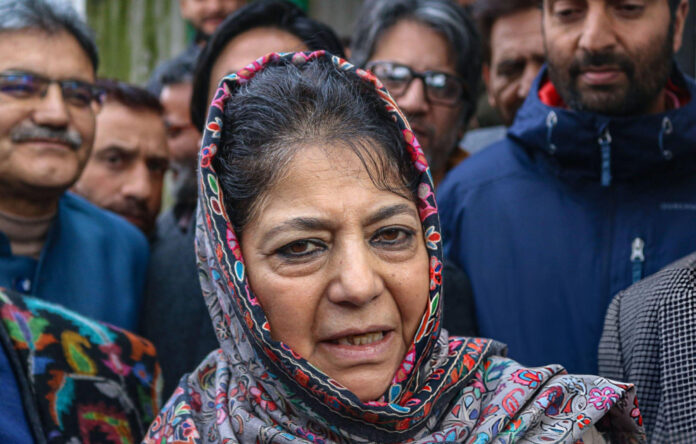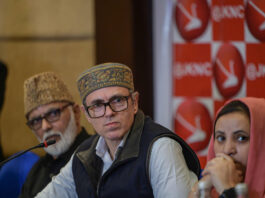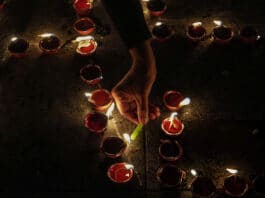The People’s Democratic Party (PDP) President Mehbooba Mufti urged the central government to reshape its approach towards Jammu and Kashmir, emphasising that meaningful engagement and steady communication remain essential for restoring trust across the region. Addressing senior party leaders during the PDP executive committee meeting in Srinagar, she said the absence of dialogue since 2019 created a vacuum that continues to affect daily life in Kashmir. Her remarks reflected growing concern within political circles over what she described as a policy centred on pressure rather than partnership. Mehbooba said the people of Jammu and Kashmir had repeatedly shown their desire for growth, development, and stability but believed these aspirations could not be fulfilled without a sustained conversation between the Centre and the citizens. She noted that the political climate over the past several years narrowed the avenues for engagement, leaving communities feeling distanced from the democratic institutions responsible for representing them. According to her, the government must reconnect with the public and revive the tradition of dialogue that once eased tensions in the region. She expressed concern that central institutions continued to rely on raids, security actions, and punitive measures, which she believed increased anxiety among ordinary residents. “People in Kashmir have chosen a path aimed at development,” she said, adding that dialogue remained the only route capable of addressing their grievances. She reiterated that the government’s silence over political representation and local issues raised questions about its current strategy. These sentiments were echoed by several PDP leaders present at the meeting, who highlighted a growing perception of alienation.
Mehbooba argued that public trust eroded over time because key democratic and constitutional rights had not been fully restored. She said that instead of healing wounds left behind by political decisions, the Centre allowed uncertainty to deepen. She called on policymakers to recognise the human dimension behind the ongoing unease. A system that restricts communication, she said, ultimately weakens its own credibility. Her demand for the revival of a political roadmap aligned with the PDP’s longstanding position that democratic processes must guide all decisions related to Kashmir. The former chief minister appealed to New Delhi to reject pressure-driven approaches and return to principles that once shaped India’s political ethos. She advised policymakers to revisit philosophies championed by Mahatma Gandhi and former Prime Minister Atal Bihari Vajpayee, both of whom promoted reconciliation and inclusion. “There is a need to win hearts rather than impose pressure,” she said, noting that only consistent outreach could stabilise current tensions. She cautioned that global geopolitical narratives should not overshadow India’s responsibility to preserve domestic harmony. Reminding party workers of her father Mufti Muhammad Sayeed’s political legacy, Mehbooba said he always believed the BJP had the potential to take bold steps for reconciliation. However, she expressed disappointment that the ruling party had not met those expectations. She urged the BJP to reassess its position, understand the emotions of Kashmiris, and discontinue the practice of framing public issues through communal rhetoric. According to her, national unity could not be strengthened by policies that deepen divides or stigmatise communities.
Mehbooba said that while the Red Fort blast probe deserved complete cooperation and transparency, constructive policing must avoid generalising entire populations. She said Kashmiri citizens continued to express support for credible investigations into any attack, whether in Delhi or within the Valley. However, she emphasised that innocence must not be overshadowed by suspicion. She argued that accountability and justice must coexist without compromising individual dignity. Her remarks addressed concerns raised in Kashmir after comments suggesting that residents were being unfairly associated with the incident. The PDP chief extended condolences to the victims of the Red Fort blast and the accidental explosion at Nowgam Police Station. She said tragedies demonstrated the fragility of life and underscored the need for unity, dignity, and patience in navigating national challenges. She urged citizens across the country to remain compassionate and to prioritise humanity while responding to distressing events. The party’s official resolution affirmed that violence could never justify any grievance, and political differences must always be resolved through constitutional channels. The party resolution warned against repeating past mistakes where force overshadowed dialogue, contributing to deeper alienation within communities. It stated that policies relying exclusively on security responses would not resolve longstanding issues. Instead, the resolution called for broad outreach by national leaders, particularly towards young people who inherited the consequences of decisions made in earlier decades. The PDP said the current generation deserved respect, trust, and engagement rather than silence or restrictions.
Mehbooba turned her focus to the youth of Jammu and Kashmir, saying they must work towards a peaceful and prosperous future rather than fall into despair. “Our youth must live for Kashmir, not die for it,” she said, expressing concern that investigation processes involving educated young men had raised alarm among families. She said the presence of despair among well-qualified youth highlighted gaps in policy and failures in addressing their aspirations. She questioned why young individuals with promising careers felt isolated in their own homeland. According to Mehbooba, education alone cannot protect society from radicalisation unless accompanied by opportunity, empathy, and a sense of belonging. She urged authorities and community leaders to engage with young people more effectively, offering support instead of scrutiny. She encouraged young aspirants to look towards leaders like Aga Muntazir, who contested elections at a young age and assumed public responsibility. She said meaningful participation in democratic processes could provide direction to a generation struggling with uncertainty.
The PDP chief reiterated that the decisions of August 2019 had stripped Jammu and Kashmir of its constitutional identity, leaving psychological scars that still required attention. She said the Centre must offer a healing touch to address concerns arising from that period. Many residents continued to express that the absence of dialogue since 2019 deprived them of channels to raise issues and express fears. Mehbooba insisted that reopening those channels would help restore dignity and rebuild trust. She urged party workers to strengthen organisational structures across various districts and prepare for upcoming local body elections. She said the PDP must return to the grassroots level, focusing on constituency-based issues and establishing solid connections with communities. According to her, public outreach remained essential for any political party aspiring to represent the people effectively. She acknowledged that while the PDP had limited representation in the Assembly, its members consistently advocated for local issues and introduced relevant bills. The PDP’s political resolution addressed concerns about the silencing of diverse voices in Kashmir due to political restrictions and security measures. It said the breakdown of dialogue between Kashmir and the rest of India made it difficult for residents to articulate their grievances or participate in national conversations. The party insisted that voices from Kashmir deserved space within the democratic framework rather than being dismissed or sidelined. It argued that facilitating free expression could bridge many divides that widened over time.
The resolution urged leaders across political parties to reach out to those whose elders once supported India’s democratic vision. According to the party, ignoring their concerns risked weakening historical bonds built over generations. It said rebuilding these relationships required inclusive attitudes and policies focused on dignity rather than suspicion. The resolution reaffirmed PDP’s commitment to non-violence, dialogue, and democratic principles, stating that peaceful engagement remained the most effective way forward. Throughout her address, Mehbooba repeated that compassion must guide policy decisions. She stated that long-term peace rested on the ability of communities and institutions to acknowledge past mistakes and work collaboratively. She said a future based on justice and mutual respect would allow Kashmir to move beyond its wounds. According to her, dialogue demonstrated strength, not vulnerability, and reliance on force alone had never produced lasting solutions. She emphasised that lasting peace could emerge only when communication channels remained open. She thanked party workers and colleagues for their resilience during difficult years, saying their faith in the party’s principles sustained the PDP’s political presence. She encouraged them to continue serving the people with dedication, especially as local elections approached. She said the road ahead required patience and unity but expressed confidence that collective efforts could rebuild trust between the people of Jammu and Kashmir and the country’s leadership.
Mehbooba Mufti’s address underscored her belief that Kashmir’s stability depends on dialogue, empathy, and consistent engagement from the Centre. Her remarks reflected the PDP’s continued push for political outreach, restoration of democratic rights, and meaningful participation for the region’s youth. As the party prepares for local body polls, it seeks to re-establish its grassroots presence while advocating for policies that prioritise trust and dignity.




